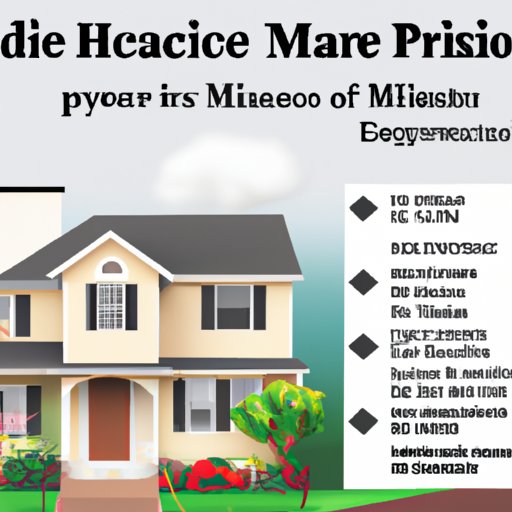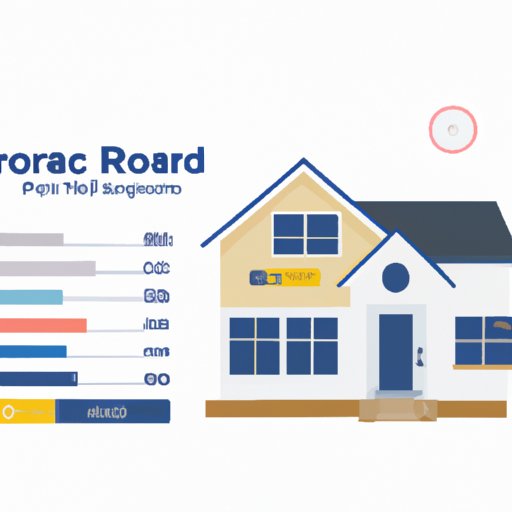Introduction
Buying a home is one of the most important decisions you will make in your life. It can be an exciting and overwhelming experience, but understanding the basics of home affordability is key to making the right choice.
Home affordability is the amount of money you have available to purchase a home. Generally speaking, it refers to the maximum amount that you can pay for a house without overextending yourself financially. Understanding how much of a house you can afford is essential before you start shopping for a new home.
In this article, we will discuss the different factors that impact your maximum home price and provide tips on how to calculate your budget. We’ll also compare the advantages of renting versus buying a home and explain the various types of home loans available.
Calculating Your Maximum Home Price: What Can You Afford?
Before you start looking for a home, it’s important to determine what your budget is. This will help you narrow down your search and focus on the homes that are within your price range.
Here are some tips on calculating your maximum home price:
Estimating Your Monthly Mortgage Payment
The first step is to estimate your monthly mortgage payment. This includes the principal and interest that you will need to pay each month. To get an accurate estimate, use an online mortgage calculator and input the loan amount, interest rate, and loan term.
Knowing Your Credit Score and Its Relevance to Your Home Price
Your credit score is one of the most important factors when it comes to determining your maximum home price. The higher your credit score, the better terms and rates you will be able to get from lenders. This means that you may be able to buy a more expensive home than if you had a lower credit score.
Determining Your Down Payment Amount
Your down payment is the amount of money you will need to put down in order to purchase a home. Generally, the larger the down payment, the lower your monthly mortgage payments will be. Aim to put down at least 20% of the purchase price to avoid paying private mortgage insurance (PMI).

Understanding the Factors That Impact Your Maximum Home Price
In addition to your credit score and down payment, there are other factors that can impact your maximum home price. Here are some of the most important ones to consider:
Comparative Market Analysis
A comparative market analysis (CMA) is an evaluation of similar properties in the area. This will give you an idea of what comparable homes are selling for and what prices they have recently sold for. This information can be used to help you determine your maximum home price.
Gross Debt Service Ratio
Your gross debt service ratio (GDSR) is a measure of how much of your income goes towards housing expenses. Banks use this ratio to determine how much of a loan they are willing to offer you. Generally, your GDSR should be no more than 32%.
Total Debt Service Ratio
Your total debt service ratio (TDSR) is a measure of your total debts compared to your income. This includes your mortgage payments, car payments, student loans, and any other debts. Generally, your TDSR should not exceed 40%.
Potential Tax Savings
Owning a home can also provide potential tax savings. Many homeowners are eligible for deductions on their property taxes and mortgage interest. This can reduce your overall tax burden and increase the amount of money you have available for a home purchase.
Discovering Your Home Loan Options
Once you have determined your maximum home price, it’s time to explore your home loan options. There are several types of mortgages available and each one has its own benefits and drawbacks. Here are some of the most popular options:
Fixed-Rate Mortgages
A fixed-rate mortgage is a loan with an interest rate that remains constant throughout the life of the loan. This type of loan offers stability, as your monthly payments will remain the same over time. However, it is important to note that fixed-rate mortgages typically have higher interest rates than other types of loans.
Adjustable-Rate Mortgages
An adjustable-rate mortgage (ARM) is a loan with an interest rate that fluctuates based on market conditions. ARMs often have lower initial interest rates than fixed-rate mortgages, but the interest rate could increase or decrease over time. This makes them riskier than fixed-rate mortgages, so it’s important to understand the terms before committing to an ARM.
Interest-Only Mortgages
An interest-only mortgage is a loan where you only pay the interest for a certain period of time. This can be beneficial for those who want to keep their monthly payments low. However, it is important to note that you will still owe the principal balance after the interest-only period ends.

Comparing Renting Versus Buying a Home
When deciding whether to rent or buy a home, it’s important to consider the advantages and disadvantages of both options. Here are some of the pros and cons of renting versus buying:
Advantages of Renting
Renting a home can be less expensive than buying one. You will not have to worry about maintenance costs or property taxes, and you can move more easily if your circumstances change. Additionally, you will have more flexibility if you decide to move after your lease expires.
Advantages of Buying
Buying a home allows you to build equity over time. You can also take advantage of potential tax savings and enjoy the freedom of being able to customize your space. Additionally, buying a home can be a good investment and can help you build wealth in the long run.
Conclusion
Buying a home is a major financial decision. Knowing how much of a house you can afford is essential before you start your search. Calculate your maximum home price by estimating your monthly mortgage payment, considering your credit score, and determining your down payment amount. Additionally, it’s important to understand the various factors that can impact your home price and to compare the advantages of renting versus buying.
By taking the time to understand the basics of home affordability, you can make an informed decision about purchasing a home. With the right preparation, you can find the perfect home within your budget.
(Note: Is this article not meeting your expectations? Do you have knowledge or insights to share? Unlock new opportunities and expand your reach by joining our authors team. Click Registration to join us and share your expertise with our readers.)
